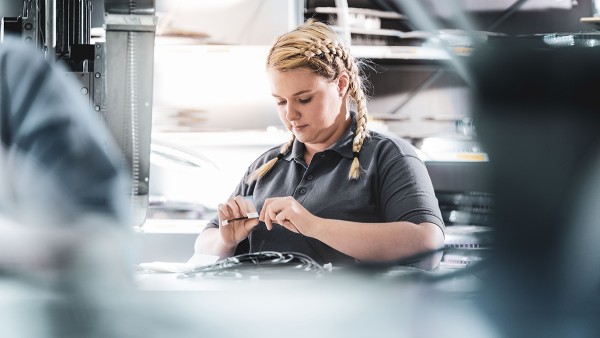All things being equal
This year Ellie Matthews becomes Schaeffler UK's first female plant manager in over 75 years. In the month of international women in engineering day (23rd June) we understand that although this is a milestone, it shouldn't be. Ellie comments on the lack of female engineers and what strengths women can bring to our industry.
Keeping up with change
It’s true to say that we are in a complex marketplace, with a great deal of uncertainty. While the coronavirus pandemic obviously caused significant issues across our entire operation, supply chain issues have been compounded and, in some cases exacerbated, by Brexit and the need for UK manufacturing to remain competitive through agility and best practice.
Furthermore, the automotive sector is undergoing immense change as a result of the sustainability based agenda and the move towards electric vehicles and e-mobility. Aligning the business accordingly is a real challenge and learning how to motivate people in turbulent times through effective team building poses its own challenges.

Empowering women
The Labour Force Survey March 202 showed that just 16.5 per cent of those working in engineering are female. The future of our industry depends on bringing more people into our workforce and it will impact our ability to develop the engineering sector if we don’t recruit more people into this type of career.
We have to cast a wider net and bringing more women into the industry is a major part of that. There are some positive signs of change though, as the number of women working in engineering occupations rose from 721,586 in Q2 of 2016 to 906,785 in Q3 of 2020.

Evidence shows significant gender differences when it comes to understanding engineering and perceptions of identity is a key factor when making subject and career choices. EngineeringUK found that only 60 per cent of girls aged 11-14 think they could become an engineer if they wanted to, compared to 72 per cent of boys. This drops to 53 per cent in the 16-19 age range, where only a quarter of girls say they would ever consider a career in engineering.
Creating a new culture
Engineering can benefit from a woman’s approach that tends to encompass more compromise, negotiation, communication and motivation. Of course, that’s not to say that men don’t possess these qualities, but engineering is, and always has been, male dominated. Conversations tend to be solutions orientated but sometimes, as demonstrated during the pandemic, compassion and empathy can be highly effective and getting the best out of people.

A failure to embrace diversity and inclusion results in missed opportunities, potential failure or marketplace disruption. Whilst diversity recognises differences between employees, inclusion embraces these differences, acknowledging that they can benefit a business. We have to create a culture that allows for this – simply saying it isn’t enough.
